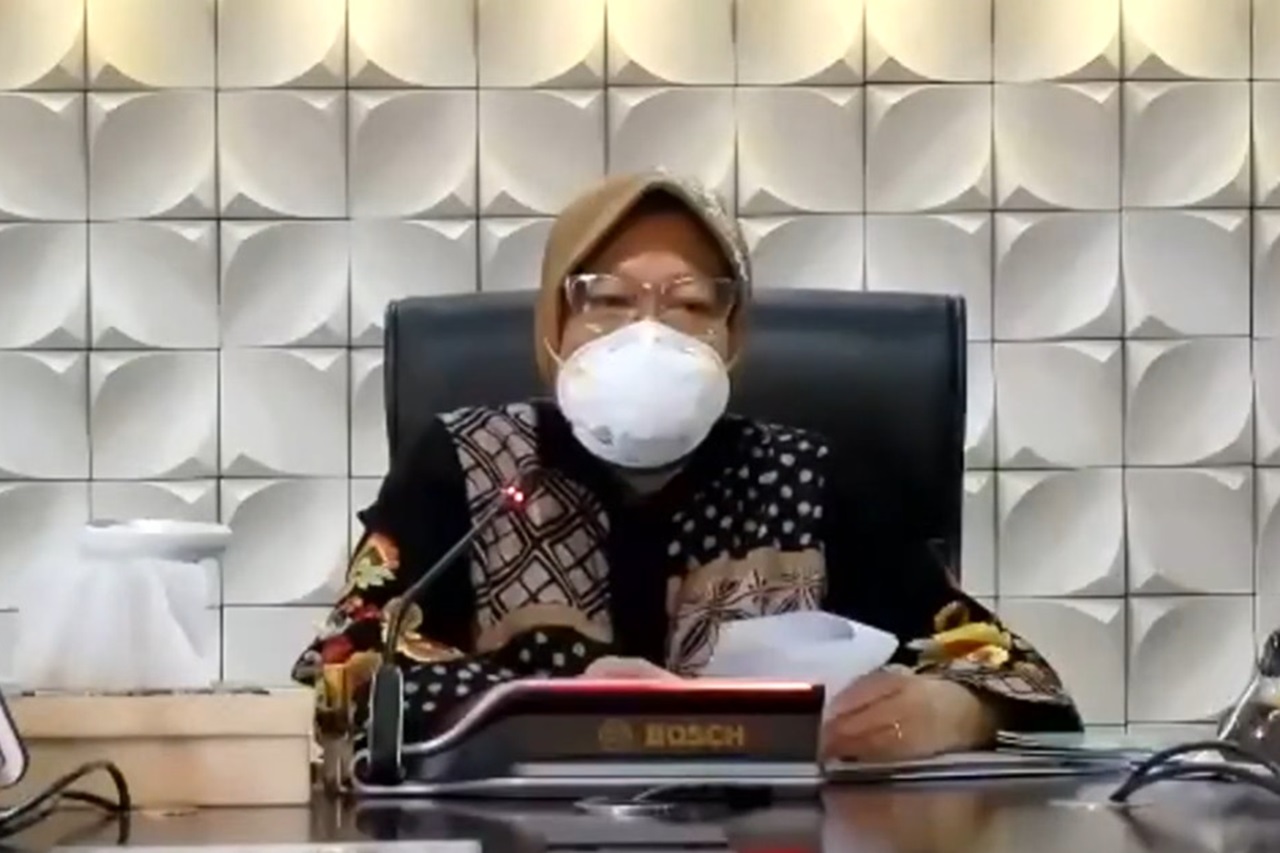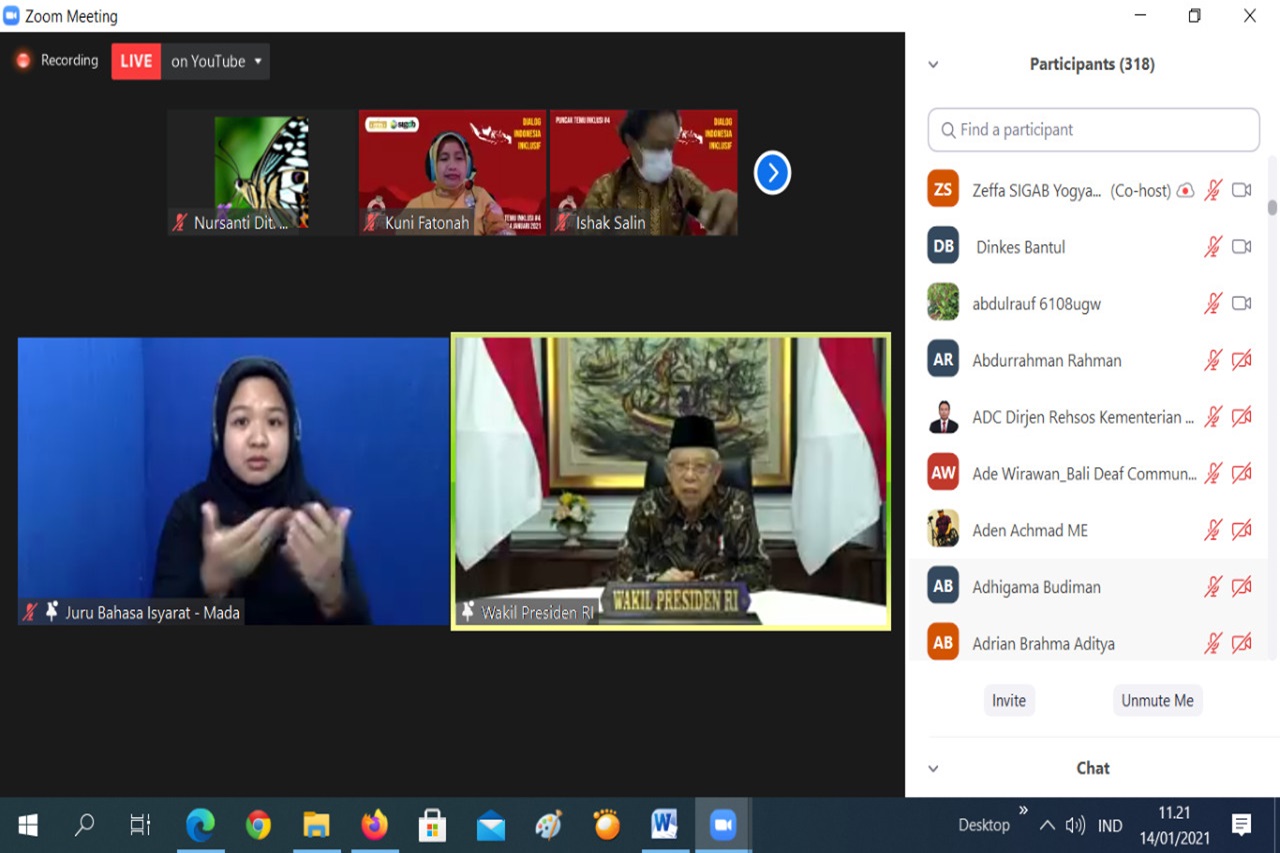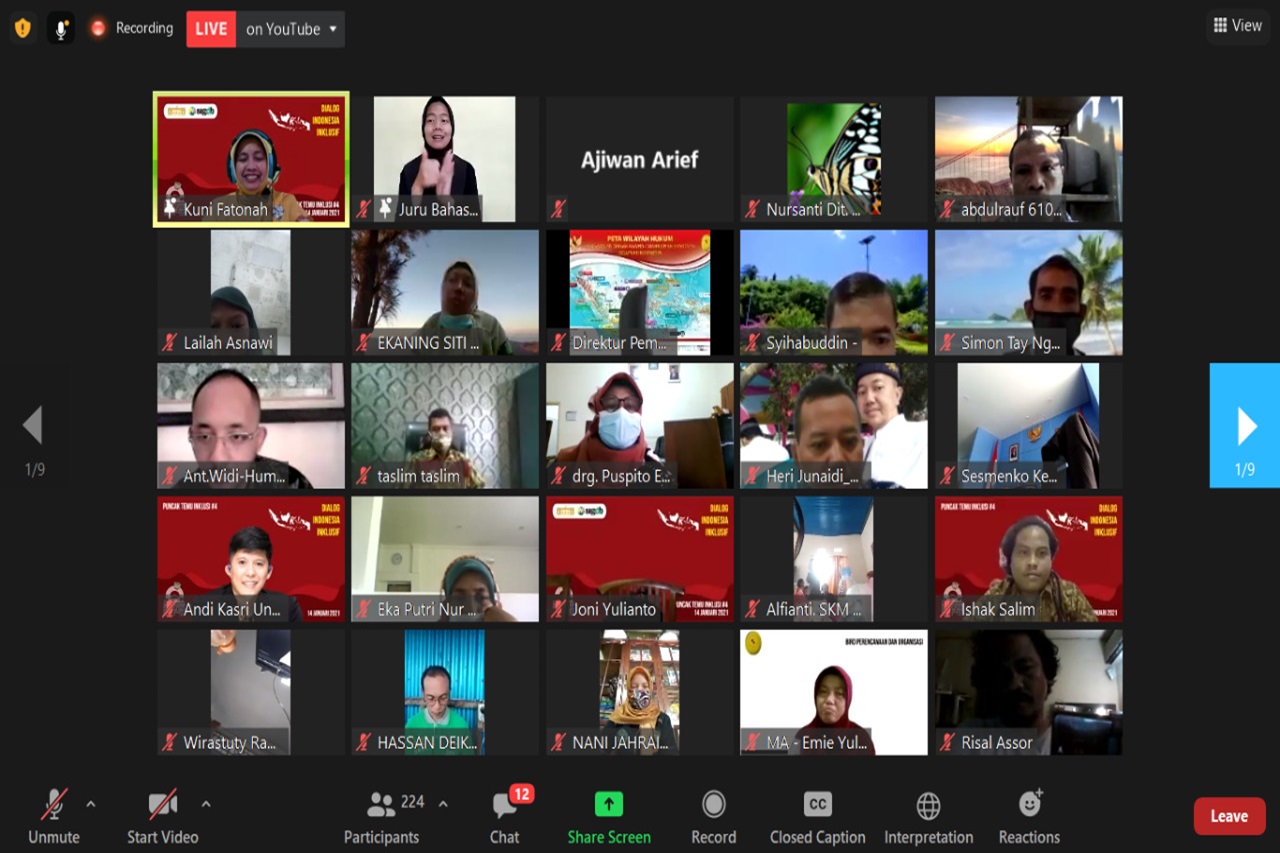JAKARTA (January 14, 2021) - The Indonesian Minister of Social Affairs, Tri Rismaharini, attended the virtual Inclusive Indonesia Dialogue organized by the Inclusion and Advocacy Movement for Disabilities (SIGAB) Yogyakarta with the theme "From Practice to Policy: Advancing Initiative, Character and Culture Towards Inclusive Indonesia 2030". The agenda of this activity is the reading of recommendations containing strategic points from various ideas and suggestion addressed to the government to implement inclusive development.
The 4th Inclusion Meeting in 2020 resulted in 12 (twelve) recommendations, namely: 1) the sector for effective participation and involvement of Persons with Disabilities in the implementation of the planning system, 2) the gender and disability mainstreaming sector, 3) fulfillment of human rights for people with psychosocial disabilities, 4 ) recommendations for the disability data collection sector and 5) inclusive village development.
Furthermore, 6) employment sector recommendations, 7) disability inclusive infrastructure, 8) inclusive education sector, 9) inclusive health services, 10) political rights sector, 11) inclusive justice sector and access to justice and 12) disability inclusive consumer protection sector .
The Minister of Social Affairs expressed this dialogue as a momentum to emphasize concern and strengthen solidarity in laying a solid foundation for the protection of persons with disabilities.
The embodiment of an inclusive Indonesia must be interpreted as an effort to emphasize that everyone must freely, openly and without pity provide facilities or accommodations for persons with disabilities, without any rejection and or obstacles in all aspects of people's lives.
"Let's synergize to overcome the problem of Persons with Disabilities. The Ministry of Social Affairs will continue to make improvements to the data and is ready to receive input for service improvement aimed at alleviating the problem," said Risma.
The 4th Inclusion Meeting in 2020 resulted in 12 (twelve) recommendations, namely: 1) the sector for effective participation and involvement of Persons with Disabilities in the implementation of the planning system, 2) the gender and disability mainstreaming sector, 3) fulfillment of human rights for people with psychosocial disabilities, 4 ) recommendations for the disability data collection sector and 5) inclusive village development.
Furthermore, 6) employment sector recommendations, 7) disability inclusive infrastructure, 8) inclusive education sector, 9) inclusive health services, 10) political rights sector, 11) inclusive justice sector and access to justice and 12) disability inclusive consumer protection sector .
The Minister of Social Affairs expressed this dialogue as a momentum to emphasize concern and strengthen solidarity in laying a solid foundation for the protection of persons with disabilities.
The embodiment of an inclusive Indonesia must be interpreted as an effort to emphasize that everyone must freely, openly and without pity provide facilities or accommodations for persons with disabilities, without any rejection and or obstacles in all aspects of people's lives.
"Let's synergize to overcome the problem of Persons with Disabilities. The Ministry of Social Affairs will continue to make improvements to the data and is ready to receive input for service improvement aimed at alleviating the problem," said Risma.
Complete data on Persons with Disabilities will greatly assist the Ministry of Social Affairs in carrying out social rehabilitation programs as part of the mandate of Law Number 8 of 2016 concerning Persons with Disabilities.
The Vice President of the Republic of Indonesia, Ma'ruf Amin as the Keynote Speech in this event hoped that with an open dialogue, he could formulate recommendations between ministries, institutions and local governments in an effort to realize disability inclusion.
"International Day of Persons with Disabilities (HDI), Human Rights Day and National Social Solidarity Day (HKSN) are a momentum for us to promote the value of inclusion, acceptance, appreciation and protection for the fulfillment of the rights of Persons with Disabilities," explained Ma'ruf Amin.
The Government of Indonesia has ratified the Convention on the Rights of Persons with Disabilities (CRPD) through Law Number 8 of 2016 concerning Persons with Disabilities which is effective and binding. This is supported by the issuance of Presidential Regulation No. 68 of 2020 concerning the National Commission for Disabilities whose membership involves the active participation of Persons with Disabilities.
"The Master Plan for Persons with Disabilities (RIPD) as a development planning and budgeting document related to respect, protection and fulfillment of the rights of Persons with Disabilities must be a reference for all stakeholders in developing planning, budgeting and program implementation," said Ma'ruf Amin.
"I ask that the quality of Human Resources with Disabilities continue to be improved, including the participation of works in all fields. Therefore, commitment in various sectors is very important," he continued.
Also attending today's dialogue, Head of the Presidential Staff Office (KSP) Moeldoko emphasized that KSP places respect, protection and fulfillment of the rights of Persons with Disabilities as one of the strategic issues that gets careful attention.
"We are serious both in the preparation of regulations and their implementation. The commitment of the President of the Republic of Indonesia and the Indonesian government in fulfilling the rights of Persons with Disabilities based on Human Rights is internationally recognized," explained Moeldoko.
Change of service paradigm for Persons with Disabilities from charity base to fulfillment of rights. "The slogan 'no one left behind' must be firmly embedded in the planning of development programs. Persons with disabilities are not helpless people, but people who are able to do something.
"The President's directive, all regulations regarding Persons with Disabilities must really be implemented by the central government and local governments which certainly requires synergy from various parties, active participation of Persons with Disabilities and organizations that provide full support," said Moeldoko.
The Vice President of the Republic of Indonesia, Ma'ruf Amin as the Keynote Speech in this event hoped that with an open dialogue, he could formulate recommendations between ministries, institutions and local governments in an effort to realize disability inclusion.
"International Day of Persons with Disabilities (HDI), Human Rights Day and National Social Solidarity Day (HKSN) are a momentum for us to promote the value of inclusion, acceptance, appreciation and protection for the fulfillment of the rights of Persons with Disabilities," explained Ma'ruf Amin.
The Government of Indonesia has ratified the Convention on the Rights of Persons with Disabilities (CRPD) through Law Number 8 of 2016 concerning Persons with Disabilities which is effective and binding. This is supported by the issuance of Presidential Regulation No. 68 of 2020 concerning the National Commission for Disabilities whose membership involves the active participation of Persons with Disabilities.
"The Master Plan for Persons with Disabilities (RIPD) as a development planning and budgeting document related to respect, protection and fulfillment of the rights of Persons with Disabilities must be a reference for all stakeholders in developing planning, budgeting and program implementation," said Ma'ruf Amin.
"I ask that the quality of Human Resources with Disabilities continue to be improved, including the participation of works in all fields. Therefore, commitment in various sectors is very important," he continued.
Also attending today's dialogue, Head of the Presidential Staff Office (KSP) Moeldoko emphasized that KSP places respect, protection and fulfillment of the rights of Persons with Disabilities as one of the strategic issues that gets careful attention.
"We are serious both in the preparation of regulations and their implementation. The commitment of the President of the Republic of Indonesia and the Indonesian government in fulfilling the rights of Persons with Disabilities based on Human Rights is internationally recognized," explained Moeldoko.
Change of service paradigm for Persons with Disabilities from charity base to fulfillment of rights. "The slogan 'no one left behind' must be firmly embedded in the planning of development programs. Persons with disabilities are not helpless people, but people who are able to do something.
"The President's directive, all regulations regarding Persons with Disabilities must really be implemented by the central government and local governments which certainly requires synergy from various parties, active participation of Persons with Disabilities and organizations that provide full support," said Moeldoko.
"KSP continues to monitor the implementation of regulations, if there is discrimination, we will monitor and coordinate to resolve the problem. We will move quickly because it is a form of our support and commitment," he said.
On this occasion, related to the coordination of the implementation of inclusion was conveyed by the Assistant Deputy for Disabled and Elderly Empowerment of the Coordinating Ministry for Human Development and Culture, Togap Simangunsong. "We will ensure that what has been conveyed in the recommendations can be implemented and the Coordinating Ministry for Human Development and Culture will coordinate ministries/agencies to jointly support the empowerment of Persons with Disabilities," said Togap.
Togap added that the national data collection of Persons with Disabilities must be carried out, not only the poor, but all Persons with Disabilities must be recorded. Their constraint is mobility, but cognitively the same as those without disabilities, so efforts are needed to empower them.
Joni Yulianto in the introduction to the dialogue said that the Inclusion Gathering is a biennial forum that is attended by disabled communities, development organizations and programs, communities, academics, representatives of government organizations and institutions from national to rural levels. "This is the 4th Inclusion Meeting as a continuous effort to discuss real ideas to encourage the inclusion of Persons with Disabilities," said Joni.
On this occasion, related to the coordination of the implementation of inclusion was conveyed by the Assistant Deputy for Disabled and Elderly Empowerment of the Coordinating Ministry for Human Development and Culture, Togap Simangunsong. "We will ensure that what has been conveyed in the recommendations can be implemented and the Coordinating Ministry for Human Development and Culture will coordinate ministries/agencies to jointly support the empowerment of Persons with Disabilities," said Togap.
Togap added that the national data collection of Persons with Disabilities must be carried out, not only the poor, but all Persons with Disabilities must be recorded. Their constraint is mobility, but cognitively the same as those without disabilities, so efforts are needed to empower them.
Joni Yulianto in the introduction to the dialogue said that the Inclusion Gathering is a biennial forum that is attended by disabled communities, development organizations and programs, communities, academics, representatives of government organizations and institutions from national to rural levels. "This is the 4th Inclusion Meeting as a continuous effort to discuss real ideas to encourage the inclusion of Persons with Disabilities," said Joni.
 Bahasa
Bahasa
 English
English




